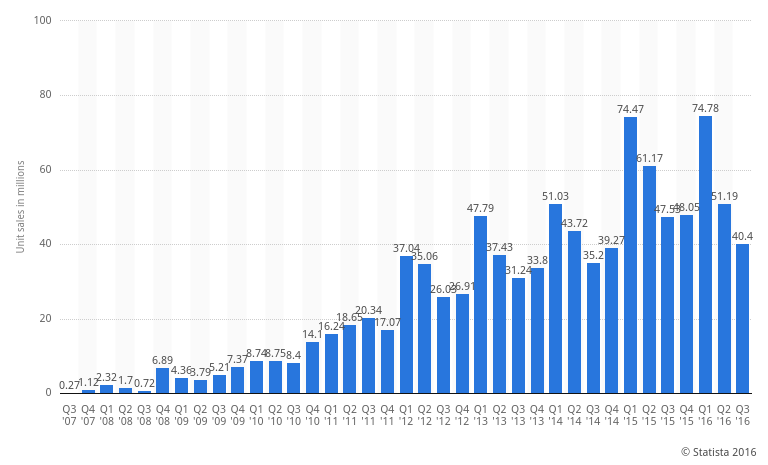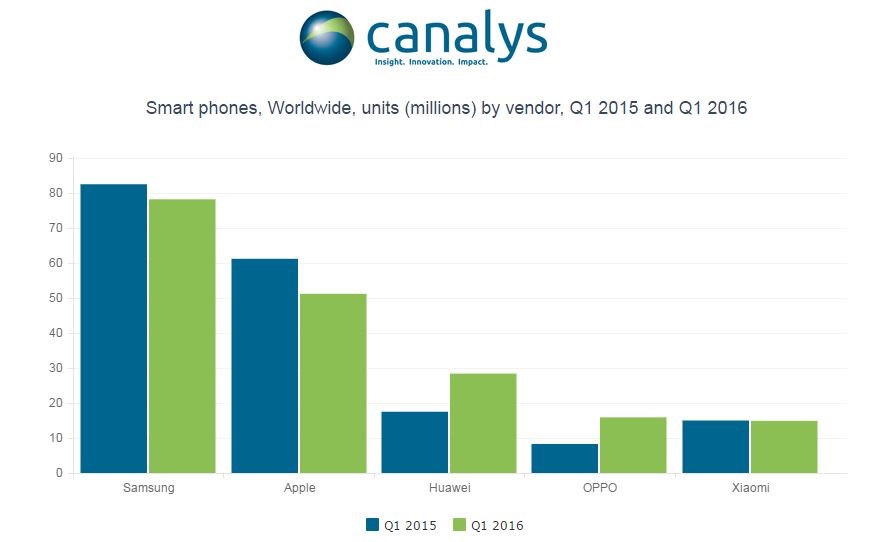Google Pixel isn't a strategy. It is a vanity project.
Google's play for the top end of the smartphone market looks more of a vanity project than a sound strategy. In a saturated market full of consumer fatigue it would have been better to expand the mid-market range.
s/iPhone/Pixel ¶
With the announcement of the Pixel phone Google has made a play for the top end of the smartphone market. The marketing video is a direct swipe at iPhones. Hey! We’ve got a headphone jack! Hey! We’ve got a great camera! Hey! We’ve got some Machine Learning stuff!
No doubt that tech journalists in San Francisco will lap this up and we’ll see some great reviews on YouTube and the tech press. Yes the hardware looks very good and with stock Android the experience will likely be good too.
But at a time when the smartphone market is becoming more saturated it seems worth exploring some data against the play to end the Nexus line of affordable good quality smartphones (the Nexus 5X retails for around £250 here in the UK) and move for the top end of the market with a phone starting at £600.
Smartphone sales are slowing ¶
The market context for all smartphone manufacturers (and Google is now one) is that smartphone sales are now slowing. Apple is seeing declining iPhone sales and the first decline in revenue in thirteen years. The chart below from Statista show the trend for Apple in millions of units. Sure they are still selling a lot but the trend is downwards.

Whilst some analysts argue that sales are slowing because of economic conditions and a slowdown in China, there is an equal argument that the market has reached saturation. Research from Canalys shows that for the first time ever Smartphone shipments are falling.

Particularly at the top end of the market to sell new phones each release must represent something hugely compelling for consumers to buy it. When upgrades include a slightly faster camera or a marginally better processor it is a no-brainer to stick with what you have got. Furthermore with new competition coming from manufacturers like Huawai and Xiaomi price becomes more sensitive.
We must compete with Apple! ¶
The Pixel seems like a board room statement that Google must compete with Apple in the top end of the smartphone market. Perhaps the strategy is just to stay in the game but the price point is extremely high and it also seems risky.
Consumer trend data shows that the market is spending less on phones and that consumer demand for smartphones is dropping. Google are entering the market right at the time the market is showing that people are buying phones less frequently and the mid-market is growing. With the Nexus line Google had a perfect play to exploit that and get more consumers onto their platform.
Pricing from a different era ¶
The Pixel looks like a solid top end phone but it seems totally at odds with how consumers are behaving in the market. It might keep Google’s board and tech journalists in San Francisco happy but my suspicion is that the market will continue to opt for high quality mid-range phones over a top-end phone whose pricing seems to come from a totally different era.
There are times when corporations make strange decisions in relation to competitors both in product releases and acquisitions. From any perspective in relation to market data this looks like a vanity project from Google.
Tags
Can you help make this article better? You can edit it here and send me a pull request.
See Also
-
From OSX to Arch Linux
Six months ago I migrated from OSX to Arch Linux. Here is why Arch is a superior development platform for my needs. -
What's wrong with Plesk
Increasingly I'm growing disillusioned with Plesk and SWsoft the company behind it. For me it is a stagnant product and a lack of competition is the root cause. -
Linux and Unix ls command tutorial with examples
Tutorial on using ls, a UNIX and Linux command for listing directory contents. Examples of listing a directory, showing hidden files, showing long listings, sorting on various items and showing recursive listings.